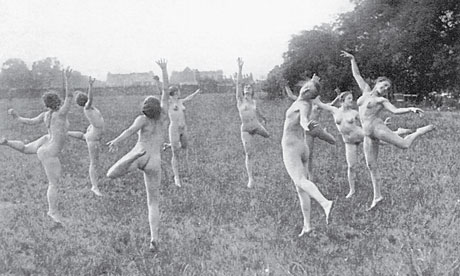 Women at Adolf Koch’s socialist body culture school, which drew on Reich’s ideas. Photograph: Mel Gordon Collection
Women at Adolf Koch’s socialist body culture school, which drew on Reich’s ideas. Photograph: Mel Gordon Collection
Excerpt:
"...In the ideological confusion of the postwar period, when the world was trying to understand the Holocaust, and intellectuals disillusioned with communism fled the security of their earlier political positions, Reich's ideas landed on fertile ground. After the Hitler-Stalin pact and the Moscow trials, Reich's theory of sexual repression seemed to offer the disenchanted left a convincing explanation both for large numbers of people having submitted to fascism and for communism's failure to be a viable alternative to it. Reich, capturing the mood of this convulsive moment, presented guilty ex-Stalinists and former Trotskyites with an alternative programme of sexual freedom with which to combat those totalitarian threats. In his biography of Saul Bellow, who bought an orgone box in the early 50s and sat in it for daily irradiations, James Atlas wrote that "Reich's Function of the Orgasm was as widely read in progressive circles as Trotsky's Art and Revolution had been a decade before."
In creating a morality out of pleasure, Reich allowed postwar radicals to view their promiscuity as political activism and justify their retreat from traditional politics. Reich made them feel part of the sexual elite, superior to the "frozen", grey, corporate consensus. People sat in the orgone box, whose empty chamber reflected the political vacuum in which the left then found itself, hoping to dissolve the toxic dangers of conformity, which, as Reich had eloquently suggested as early as 1933, bred fascism. As Michael Wreszin put it in his 1994 biography of Dwight Macdonald, who promoted Reich's ideas in his anarchist-pacifist magazine Politics and hosted nude cocktail parties and orgies at his Cape Cod retreat: "In the gloom of the cold war years intellectuals whose historicism had been shaken faced the choice of either accommodating themselves to a prosperous anti-communist society or taking a stand directly on what Mailer, citing Reich, called 'the rebellious imperatives of the self'."...




No comments:
Post a Comment